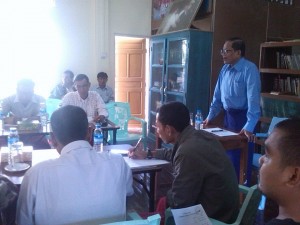The nationwide ceasefire agreement cannot be signed on Union Day because no agreement will have been reached on certain promises and rules both sides should follow according to Nai Hongsar the leader of the ethnic Nationwide Ceasefire Coordination Team.
 The government was hoping to sign the agreement on Union Day, the 12th February, but this seems very unlikely according to Nai Hongsar’s comments, which he made in an interview with the IMNA editor before meeting with civil society organisations (CSOs) at Nai Shwe Kyin Library in Mawlamyine City, Mon State on 11 January.
The government was hoping to sign the agreement on Union Day, the 12th February, but this seems very unlikely according to Nai Hongsar’s comments, which he made in an interview with the IMNA editor before meeting with civil society organisations (CSOs) at Nai Shwe Kyin Library in Mawlamyine City, Mon State on 11 January.
Nai Hongsar said: “Both sides need to agree on a military ‘code of conduct’ to prevent fighting or any other crisis after the ceasefire agreement has been signed and some forces will have to move location. If we are still firing at each other after the ceasefire agreement what will have changed?”
Although the ethnic armed groups have signed state and union level ceasefires with their state governments and the union government they are all still fighting with government forces in their regions, except the NMSP in Mon State.
Nai Hongsar said: “The next important points [we need to agree on] are exact decisions and agreements on how the political dialogue [which will follow the signing of the nationwide ceasefire agreement] should be held. In reality the nationwide ceasefire agreement cannot be signed yet because there are still points to be discussed and we need to have talks at a time that is convenient to both the government and the armed groups.”
Nai Hongsar is also the vice chairman of the New Mon State Party (NMSP).
Translated by Aung Myat Soe English version written by Mark Inkey for BNI



